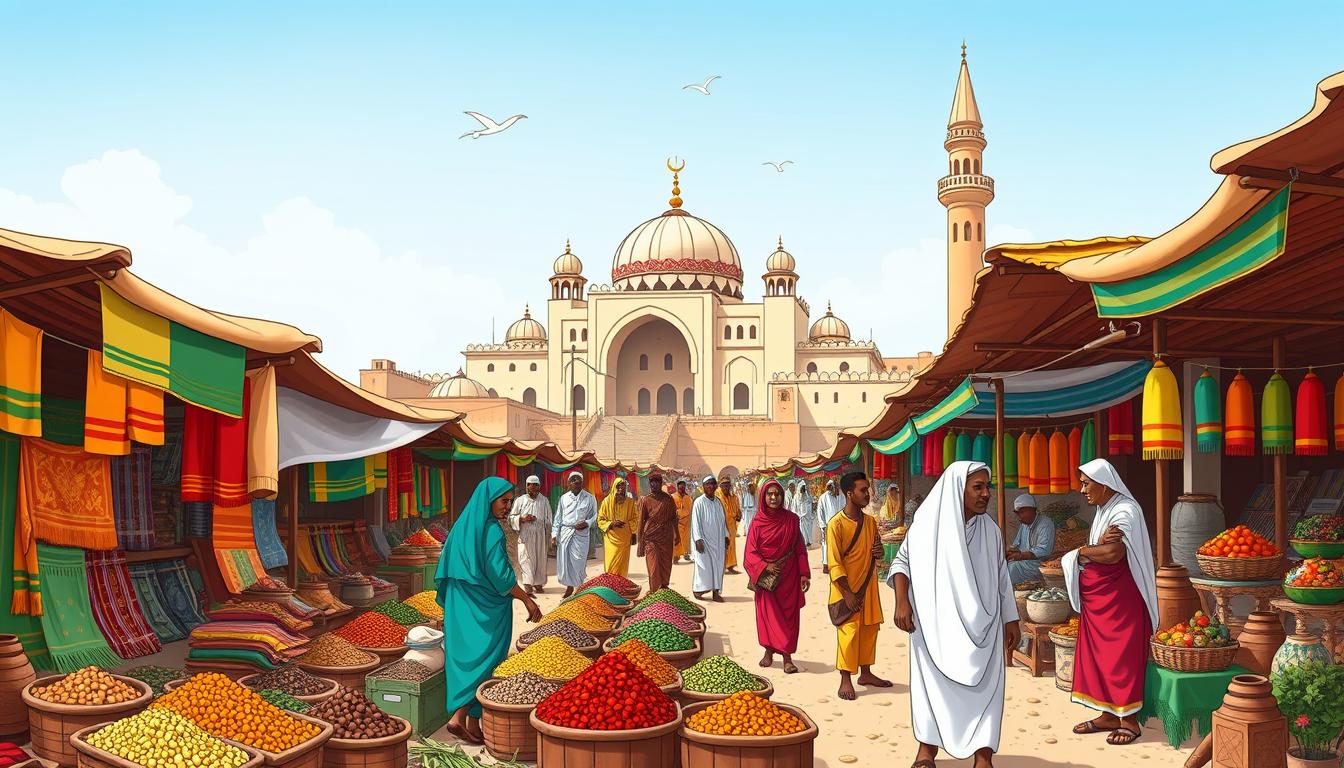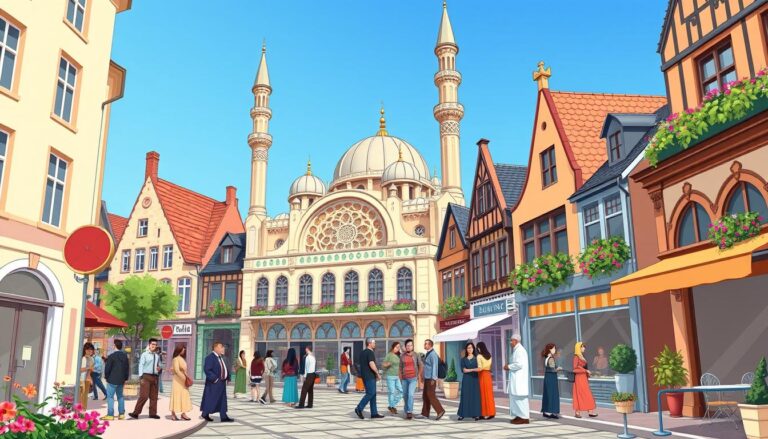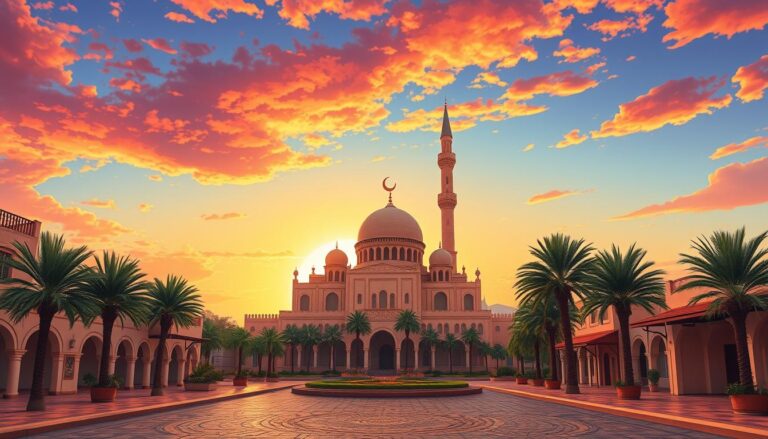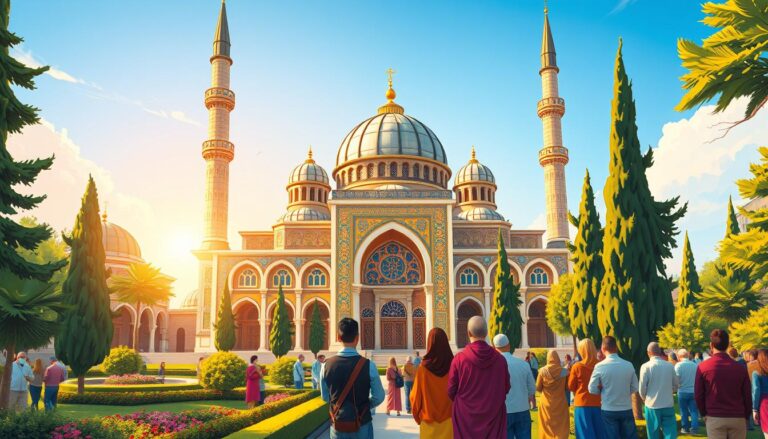Islam in Djibouti
Islam has a long history in Djibouti, with 98% of the 490,000 people being Muslim. Pew Research says 77% of Djiboutian Muslims are Sunni, mainly following the Shafi’i legal tradition. The rest are non-denominational Muslims or belong to other sects like Quranism, Shia, and Ibadism.
After gaining independence, Djibouti built a legal system that includes Islamic law. This shows how important Islam is in the country’s society and government.
Muslim Demographics in Djibouti
Djibouti is a country where most people are Muslim. Sunnis make up 77% of the Muslim population. The rest are non-denominational Muslims and followers of other sects like Quranism, Shia, and Ibadism.
Only 6% of the population is not Muslim. They live mostly in the capital city. This group includes foreigners and expatriates.
Sunni Majority and Other Muslim Sects
The Sunni Muslims in Djibouti are the biggest religious group. They mostly follow the Shafi’i school of Sunni Islam. Other Muslim sects like Quranism, Shia, and Ibadism are less common.
Geographic Distribution of Muslims
The geographic spread of Muslims in Djibouti is mainly in the capital and the southeastern part of the country. The Afar people, mostly Muslim, live in the western and northern areas of the Gulf of Tadjoura. Somali people, also mostly Muslim, are found in the capital and the southeastern region.
“Djibouti has a 97.67% Muslim population, primarily Sunni, with a small percentage of other religions including Roman Catholics, Protestants, Copts, Ethiopian Orthodox, Greek Orthodox, Jehovah’s Witnesses, and Baha’is.”
Historical Roots of Islam in Djibouti
The story of Islam in Djibouti starts with the early days of Islam’s spread in the Horn of Africa. After Prophet Muhammad’s migration, Islam reached the area. The oldest mosque, Masjid al-Qiblatayn in Zeila, Somalia, shows Islam’s early presence.
Arrival of Islam in the Horn of Africa
By the late 9th century, Al-Yaqubi noted Muslims along the Somali coast. The Adal Sultanate, with its base in Zeila, emerged around the 9th or 10th century. It played a key role in the history of Islam in Djibouti.
Influence of the Adal Sultanate
The Adal Sultanate controlled parts of Djibouti, Somalia, Eritrea, and Ethiopia. It was a major Islamic state that helped spread Islam in the Horn. Its legacy and interactions with the Ottoman Empire shaped Djibouti’s culture and religion.
“The Adal Sultanate, with its capital in Zeila, dates back to at least the 9th or 10th century and played a significant role in the history of Islam in the region.”
Djibouti’s history is deeply rooted in Islam. This has shaped its society and identity, making Islam a core part of the nation.
Islam in Djibouti
Islam is a big part of Djiboutian life, with 94% of people calling themselves Muslim. The country’s constitution says Islam is the official religion. The government plays a big role in Islamic affairs, like mosques and schools.
The government also checks what imams say on Fridays. This shows how important Islam is in Djibouti.
About 77% of Djibouti’s Muslims are Sunnis, following the Shafi’i tradition. 8% are non-denominational Muslims, and 13% belong to other Islamic groups. Shia Muslims make up 2% of the population.
The government is very involved in Islamic matters. It controls mosques and hires imams. The Ministry of Islamic and Cultural Affairs oversees Islamic schools that teach the Saudi curriculum.
Public schools teach a secular curriculum. Private schools, run by religious groups, offer a course on civic and moral education based on Islam.
Even though the government watches over religious activities, the constitution protects religious freedom. Non-Islamic groups like Catholic and Protestant churches can operate freely. But, changing religions, especially for Muslim women, is frowned upon by society and the Family Code.
“Islam is deeply ingrained in Djiboutian society, with 94% of the population identifying as Muslim.”
Islamic Practices and Traditions
Djibouti, a small nation in the Horn of Africa, is mostly Sunni Muslim. They follow the Shafi’i school of Islamic law. This school is known for its balanced approach to religion.
In Djibouti, there’s also a big group of non-denominational Muslims. They belong to different Sufi orders. These Sufi Muslims live in harmony with Sunni Muslims, adding to the country’s rich Islamic culture.
Sunni Practices and Shafi’i School
Djiboutian Sunni Muslims follow the Shafi’i school. This school is famous for its moderate and flexible way of interpreting Islamic law. It helps them balance their religious life with everyday activities, creating a strong sense of community.
Sufi Orders and Non-denominational Muslims
The non-denominational Muslims in Djibouti are connected to Sufi orders. These orders are known for their spiritual and mystical traditions. They mix local culture with their rituals, creating a unique form of Sufism in Djibouti.
The government keeps an eye on Islamic institutions but lets Sunni and Sufi practices go on. They only check Friday sermons to make sure they fit the country’s moderate and inclusive Sunni Islam in Djibouti.
Government’s Role in Islamic Affairs
In Djibouti, the Ministry of Islamic Affairs and Waqfs has a big role. It looks after all Islamic places, like mosques, and picks imams. The ministry also checks Friday sermons to make sure they match the government’s view of Islam.
The Djiboutian government has made laws to watch mosques and religious events more closely. They say it’s to fight against “extremist” ideas from abroad and support a “moderate” Islam. This way, the government can keep Islamic practices in line with its goals.
Ministry of Islamic Affairs and Waqfs
The Ministry of Islamic Affairs and Waqfs is key in managing Islam in Djibouti. It handles mosques, Islamic schools, and religious trusts (waqfs). The ministry makes sure these places follow the government’s idea of Islam.
- The ministry picks imams, giving the government control over mosque leaders.
- The ministry gives scripts for Friday sermons, controlling what’s said from the pulpit.
- The ministry watches mosques and religious groups, both local and foreign, to stop “extremist” ideas.
Regulation of Mosques and Imams
The Djiboutian government has set up rules to control mosques and imams. This is to support a “moderate” Islam and fight off foreign religious influences.
- All mosques and religious groups must register with the Ministry of Interior and go through a background check.
- Imams in Djibouti work for the Ministry of Islamic Affairs, so the government controls their teachings.
- The government stops mosques from getting involved in politics, limiting them to religious and social work.
“The government of Djibouti has taken a proactive approach to regulating Islamic affairs, reflecting its desire to maintain a tight grip on the country’s religious landscape and promote its own interpretation of Islam.”
Islamic Education and Schools
In Djibouti, the government oversees the curriculum and teacher training of about 40 private Islamic schools. These schools are a small part of the total educational institutions. The public school system is mostly secular.
The Djiboutian government requires all schools to teach a civic and moral education course based on Islamic principles. This policy makes sure Islamic teachings are part of the education, even in non-religious schools.
Public and Private Islamic Schools
Most schools in Djibouti follow a secular curriculum. But, the government’s control over private Islamic schools and the need for all schools to teach Islamic-based courses show Djibouti’s dedication to Islamic education. This balance aims to keep the educational landscape diverse while honoring Djibouti’s Islamic heritage.
“The Djiboutian government has a nuanced approach to Islamic education, recognizing the importance of preserving cultural and religious traditions while also maintaining a secular public education system.”
Islamic Art and Architecture
Djibouti’s Islamic heritage shines through in its stunning art and buildings. The country boasts many mosques and religious sites. These places show off Islamic design, like domes, arches, and detailed calligraphy. They are not just places of prayer but also symbols of Islamic art’s lasting impact in Djibouti.
The Hamoudi Mosque, built in 1906 by a Yemeni merchant, is a key example. It can hold about 1,000 people and is a major religious spot. The mosque’s location near diverse communities means all sermons are in Arabic, uniting different ethnic groups.
Djibouti has 147 mosques, each a blend of Islamic art and architecture. The walls are adorned with intricate patterns, and the domes are majestic. This shows the strong Islamic influence in Djibouti’s architecture and faith.
“The Alhambra of Granada, a monumental complex, represents the epitome of Islamic art in Spain, designated as a UNESCO World Heritage Site.”
While Djibouti may not be as well-known as Spain for its Islamic art, its culture is still captivating. The presence of these structures proves the lasting impact of Islamic art and architecture in Djibouti.
Islamic Influence in Djiboutian Society
Islam deeply influences Djiboutian culture and society. The country’s customs and social networks often discourage leaving the faith. About 94% of Djibouti’s people follow Islam, with Sunni being the main branch.
Cultural and Social Norms
The Islamic faith impacts many parts of Djiboutian life. It shapes traditional dress, food, family structures, and gender roles. Djibouti’s people belong to several ethnic groups, with Somali and Afar being the largest.
Legal System and Islamic Law
Djibouti’s laws include parts of Islamic law. This is seen in marriage, divorce, and inheritance. People can choose to have these matters decided in civil courts or sharia courts. This shows the strong role of Islamic law in Djibouti.
“Islam permeates many aspects of Djiboutian culture and society, shaping everything from social norms to the legal system.”
The Islamic influence on Djiboutian culture is clear. The faith deeply influences the country’s identity and lifestyle. From Sunni Islam to sharia law, Djibouti’s society is shaped by Islamic principles.
Challenges and Controversies
In Djibouti, the treatment of religious minorities is a big concern. The government says it respects the rights of non-Muslim groups. But, these communities face many challenges.
Changing one’s religion from Islam is hard because of social pressure. Also, non-Muslim groups must go through a long and tough process to legally operate in the country.
Treatment of Religious Minorities
Djibouti is mostly Muslim, with most people following Sunni Islam. But, there are also Christians and Baha’is living there. These groups say they face problems in practicing their faith freely.
The government watches their activities closely. It also limits how they can operate.
Efforts to Counter Extremism
The Djiboutian government is trying to stop extremist ideas in mosques. It checks the content of Friday sermons. Imams are given approved scripts to teach “moderate” Islam.
The government also works with countries like Somalia, Egypt, and Saudi Arabia. They aim to stop radical ideas from spreading.
“The government has taken a heavy-handed approach in its efforts to counter extremism, often at the expense of the rights of religious minorities.”
While the government wants to keep the country safe, some say it’s hurting the rights of non-Muslims. They argue that these actions are not fair.
The situation in Djibouti shows a tough balance between protecting rights and keeping the country safe. The government needs to find a way that respects everyone’s beliefs. This is important for the country’s future.
Islam in Djibouti
Islam is the main religion in Djibouti, with 98% of people calling themselves Muslim. The religion arrived in the Horn of Africa soon after Prophet Muhammad. Today, most Muslims in Djibouti are Sunni, following the Shafi’i school of law. There are also non-denominational Muslims and other Islamic groups.
The government of Djibouti has a big role in Islamic affairs. It controls mosques, imams, and religious schools. This is to fight extremist ideas and promote a “moderate” Islam. The Muslim culture in Djibouti is deeply connected to the country’s history.
“Djibouti’s size is comparable to the U.S. state of Massachusetts, predominantly featuring stony desert, with scarce supplies of potable water and desertification challenges.”
Despite the harsh climate and limited resources, Islam remains strong in Djibouti. The government helps shape the religious scene. Djibouti’s location near busy shipping lanes has also changed it from a rural to an urban society.
Djibouti’s history is linked to Islam’s spread in the region. The Somali and Afar tribes were early adopters of Islam. This rich Islamic heritage influences Djibouti’s society, culture, and politics. Djibouti is a unique place for those interested in Muslim culture in Djibouti.
Conclusion
Islam has a strong impact on Djibouti, influencing its culture, politics, and laws. Despite the government’s control, the country has a diverse Muslim population. This diversity is a key part of Djibouti’s identity.
Djibouti’s role as a trading hub has boosted its economy and ties with neighbors. Partnerships with countries like Ethiopia and Somaliland show promise for growth. Yet, the country faces challenges like economic pressures and demographic changes, especially among the Afar community.
Djibouti must find a balance between its Islamic roots and the changing world. The Muslim community’s resilience suggests Islam will continue to shape the country’s future. This balance will be crucial for Djibouti’s development.
Source Links
- Islam in Djibouti
- Djibouti – United States Department of State
- Djibouti – United States Department of State
- National Profiles | World Religion
- The Major Religions Practiced in Djibouti
- Djibouti | History, Capital, Map, Flag, Population, & Facts
- Djibouti History
- History of Djibouti
- Djibouti
- Djibouti – United States Department of State
- No title found
- Tolerance and Tension: Islam and Christianity in Sub-Saharan Africa
- 2016 Report on International Religious Freedom – Djibouti | Refworld
- Many Countries Favor Specific Religions, Officially or Unofficially
- Djibouti – United States Department of State
- BTI 2024 Djibouti Country Report
- Microsoft Word – DJIBOUTI DECLARATION-FINAL
- 9789004335707_print_content_text.indb
- Islam and Somali social order
- Islamic art: characteristics, works, architecture and mosaics
- Hamoudi Mosque, Djibouti’s Most Iconic Mosque – Explanders
- Culture of Djibouti
- CJTF-HOA Commanding General Visits Djibouti Mosque
- Djibouti and the Death of Hamoudi Ahmed
- Djibouti – United States Department of State
- Djibouti – United States Department of State
- Djibouti – New World Encyclopedia
- Djibouti – Afar, Somali, French
- Ramadan in Djibouti
- The Afar of Djibouti: Maintaining Identity Amidst Conflict







